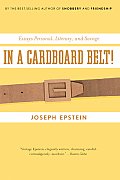 by Joseph Epstein
by Joseph Epstein
“I interest myself.” That was Joseph Epstein’s motto during his 23-year run as editor of The American Scholar. Not a bad philosophy, when your interests are as broad as his. He interests us, too, in his latest collections of essays, In a CardboardBelt!
Epstein just turned seventy, so his age has finally caught up with his writing. His essays have always had an air of maturity about them, both in subject and in tone. His two collections of short stories were both about characters a decade older than himself at the time. Even the titles of his books – The Middle of My Tether, Narcissus Leaves the Pool, With My Trousers Rolled – evoke age. So it’s not surprising that some of his themes begin to reflect age. He writes of his own age, his leave-taking from lecturing at Northwestern, his father, and memorial and obituaries in general.
His topics are, as the Table of Contents indicates, Personal, Attacks, Literary, and Intellectual. Epstein’s writing is fluid, light, witty but not gut-bustingly funny. He’s mastered the art of letting the essay flow from one aspect of the subject to the next. He writes so well that a cursory, 10-minute review yielded 14 Post-It notes. Memorable lines, but not necessarily quotable ones. Even the anecdotes require context to make sense.
There are a few darts. In his essay on Proust, he remarks about one reader-turned-memoir-writer:
…[Phyllis] Rose offers an example of the limits of education and culture, for in her a vast overlay of both has not been able to cover up the inexhaustible shallows of a confident but unoriginal mind.
While the cover promises “savage” essays, those looking to read, or have the easy pickings of responding to, Ann Coulter-like screeds will be disappointed. The essays in the Attacks section are essentially the same as the ones in the Literary section: smart, insightful dissections of people or their careers. None of these really goes beyond his earlier essay on Robert Hutchins of the University of Chicago, the “Boy Wonder.”
The exception is his slicing up and serving of Mortimer Adler, which even then, is done in typical Epstein-like style. The impression one has is of one of those cartoon swordfights, where one character flicks his sword through the other a few dozen times, while slices of the filet, eyes still blinking, slide neatly into piles on either side. Beginning with Adler’s myth, he neatly, methodically reduces him to a figure of fun.
I do not know of any genuine contribution that Mortimer Adler made to serious philosophy, though before he went into big-time indexing he was though a serious Thomist…. Sidney Hook once told me that it was proof of Dewey’s honorableness that not even Mortimer Adler could drive him into anti-Semitism.
Ouch.
The personal essays are among the most fun, possibly because they shed light on common experiences. His essay on how, after 70 years, he’s figured out that he really doesn’t like to travel, is brilliant.
“I hereby sentence you,” runs a standard judge-and-defendant cartoon in a recent New Yorker, “to the Vermeer show on a Saturday afternoon.”
Not funny, McGee. Not if you have, as I have, woken in the Jan Luyken Hotel in Amsterdam at 4 A.M. to drive to The Hague to stand in line in the cold drizzle of a Dutch morning to get tickets to see twenty-six paintings by Vermeer as part of a crowd that was even more wall-to-wall than the carpeting.
Unlike most 57-word sentences, you get to the end remembering where you started. Extra points, too, for knowing who McGee is.
On eating out, in the 1970s: “One would go to a party and be asked, not what one thought of the latest Robert Altman or Woody Allen flick or (more important) what Pauline Kael thought of it, but if one had been to the recently opened bistro on Halsted Street or trattoria on Southport.” The joy, the choices, the trendiness, the shallowness.
Epstein’s essays are rich because he makes serious points tangentially: “The Brothers Ashkenazi remains a magnificent novel, one in which the villain is no less than the country of Poland, and the first book in which I learned, a lesson often repeated, that the one thing the far left and the far right always come around to agree upon is hatred of the Jews.”
On cleaning out his library, getting rid of thousands of books: “The Russians did not do well in this purge.”
The set also includes his final essay for The American Scholar, must-reading for anyone who wants to understand the ravages of political correctness and identity politics. Epstein writes without rancor or malice about the decision to force him out. Indeed, he focuses more on the board and its historic personalities, who turn out to be a lot like everyone in every board meeting of any organization you’ve ever attended.
One can’t help but share Epstein’s evident more-sadness-than-anger about the board’s decision to sack him in the face of identity politics – in this case, animosity over using the word, “homosexual” instead of, “gay” in a submission. That decision then led Phi Beta Kappa, which publishes the journal, to sit on and then reject a $2 million gift – and all the good it could have done – from a conservative organization, supposedly out of fear that it might save Epstein’s job. So much for fiduciary responsibility.
Still, Epstein is turning seventy, not dying. Even if The American Scholar doesn’t want him around, here’s looking forward to the next book.